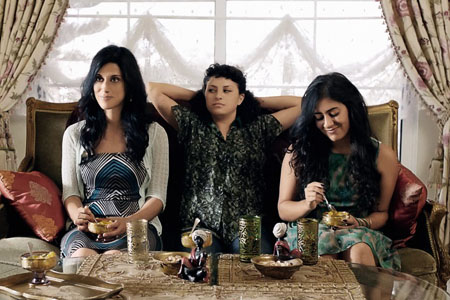Cherien Dabis’s May in the Summer is “a knotty, overwritten, intermittently affecting examination of the silent distances between three apparently devoted sisters reunited for the eldest’s wedding, and the more overt parental estrangement that binds them,” writes Guy Lodge at In Contention. “Arriving three years after Amreeka, Dabis’s acclaimed debut feature about a Palestinian-American family uprooted from the West Bank to Chicago in the wake of 9/11, her sophomore effort—in which the striking writer-director further burdens herself with the lead role—once more treads the thematic terrain of East-West (or Middle East-West, to be precise) cultural clashes. Or so it slyly appears, until Dabis’s cluttered, quarrelsome narrative boils down to more universal family sore points than, say, a born-again mom’s disapproval of her daughter’s Muslim fiance, or two American-Jordanian sisters’ petty rivalry over which one speaks better Arabic…. For these women, cultural difference has become an alibi for mundane personal frictions. That’s the most provocative and self-effacing idea in Dabis’s thick-spread script; but it’s far from the least subtle, as her characters helpfully restate their personal and spiritual grievances every quarter-hour or so.”
Variety‘s Justin Chang finds that “this warmly conceived but largely formulaic picture is by turns sensitive and shrill, culturally perceptive and overly broad in its dysfunctional-family melodramatics…. Dabis’s script has a messy, close-to-home quality born of an honest affection for her characters, as well as a determination to illuminate the universal frustrations of family life in this highly specific setting. At a certain point, one begins to lose track of all the various forms of culture clash being explored here: rifts between parents and children; differences of ethnicity, religion and gender; the unique challenges facing a biracial family in a Mideast nation with an ever-growing Western influence…. Still, for every moment that feels pleasantly eye-opening, there’s a scene that achieves the reverse by straining for comedic or dramatic effect, pushing the material into alternately soapy and sitcomish territory.”
“Underlining her personal connection to the lives being depicted onscreen, the writer-director also steps in front of the camera for the first time,” notes David Rooney in the Hollywood Reporter. “She plays May, a New Yorker who has published a successful book reinterpreting Arabic proverbs and is now beginning a novel set in 1940s Palestine…. Attractively shot by Brian Rigney Hubbard, the film has a vivid feel for the fusion in Jordan of tradition with American influences. Propelled by Carlo Siliotto’s jaunty Middle East-meets-West score, it moves along breezily, especially in the early action, with Dabis showing a keen understanding of the mellow bonds and sudden eruptions of friction between sisters.”
“Although the actresses don’t resemble each other even slightly,” notes Sam Adams at the AV Club, “their sisterly rapport is perfectly captured, a mixture of half-formed jokes and long-simmering resentment. But Dabis’s touch grows clumsier when she needs to push the plot forward, and her shot choices range from odd to almost incompetent. She shoots stationary conversations from directly opposite angles, so that characters leap from one side of the screen to another, and when she tries to track all three sisters in a single shot, the result is visual chaos. The Sundance Labs have birthed dozens of great films, but it doesn’t speak well for the program when a graduate comes to her second feature lacking a full set of basic tools.”
David D’Arcy profiles Dabis for the National.
Updates: “Its storytelling alone makes May in the Summer stand out from the industry standard for this form of pre-wedding drama, but the movie also impressively avoids making a big deal out of its milieu,” writes Indiewire‘s Eric Kohn. “More than anything else, May in the Summer holds together due to its committed lead performance. Dabis, making her acting debut, comes across as aggressively confident onscreen as she is behind it.”
But for Entertainment Weekly‘s Lisa Schwarzbaum: “Every woman has a conflict, both within herself and with others; every man poses a problem; every shot of Amman looks random and muddy; every beat in the script feels worked and reworked.”
“I’ll say this for slotting May in the Summer as the kick-off flick,” writes Time Out New York‘s David Fear: “It proves that Redford’s assertions that the fest exists to serve the Sundance Institute’s fellows, and not the other way around, isn’t a lot of hot air.”
Updates, 1/19: “The drama never fully takes off, and the laughs are too few and far between to offset the film’s fundamental deficiencies,” finds Michael Nordine at Film Threat.
“May in the Summer becomes as mired in doubt about where it wants to go as our heroine is about her feelings for her fiancé,” writes Nicholas Bell at Ioncinema. “It quickly slips into an overly familiar melodrama, throwing us into a sort of foreign born It’s Complicated scenario that may not feed us as much preposterousness as that film, but still flails wildly, ending predictably and unforgettably.”
Updates, 1/26: The Voice/LA Weekly‘s Scott Foundas finds that “as in her previous film Dabis is smart enough to balance broadly accessible comedy with sharply drawn, three-dimensional characters and a personal, reflective sensibility.” For John Wildman, dispatching to Film Comment, “it’s a lukewarm sell.”
Sundance 2013: Index to our reviews, reports, and coverage of the coverage. For news and tips throughout the day every day, follow @KeyframeDaily on Twitter and/or the RSS feed. Get Keyframe Daily in your inbox by signing in at fandor.com/daily.





